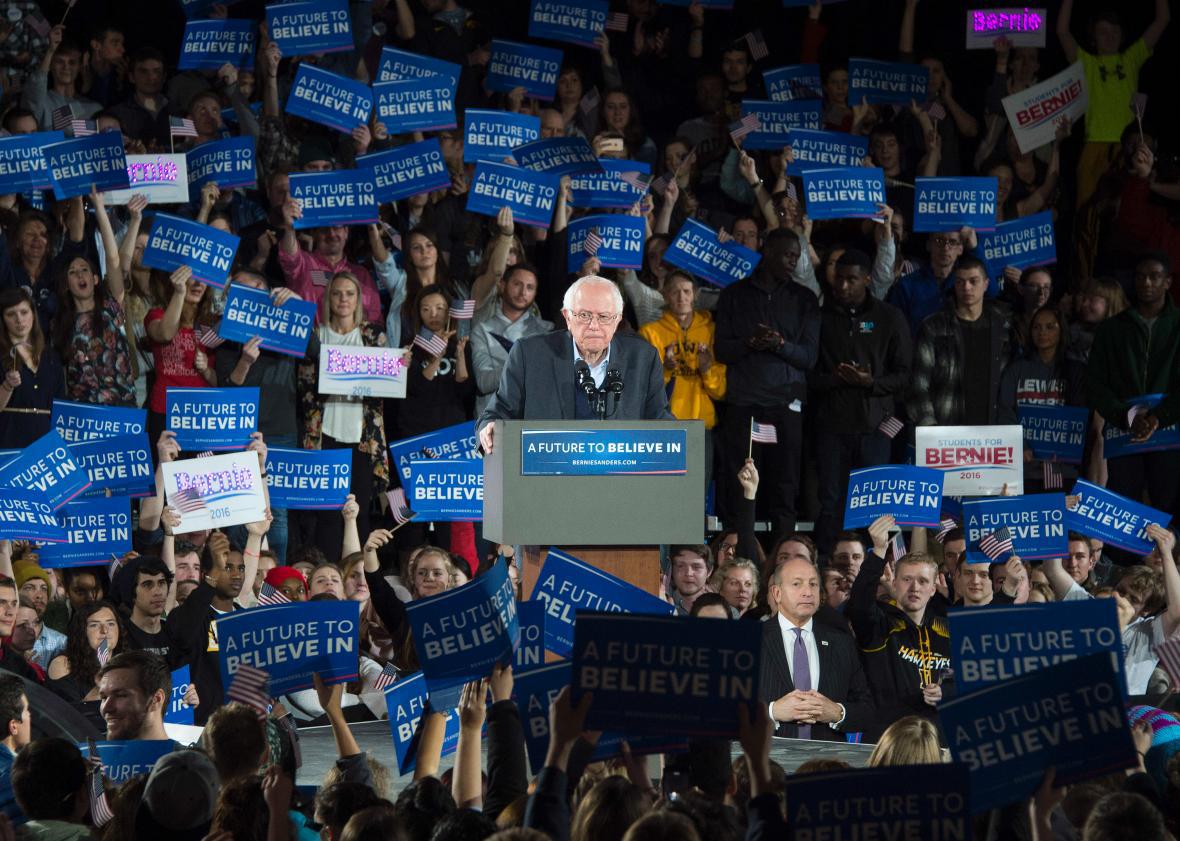The Democratic nominating contest officially kicks off in Iowa on Monday night. The caucus won’t decide the race, but it should tell us whether the party’s primary is going to be a contest or a coronation. Here’s where things stand heading into caucus night (all polls are Iowa specific):
Hillary Clinton
RealClearPolitics average: 47.3 percent, down 2.7 points from Jan. 1.
Des Moines Register/Bloomberg: 45 percent, up 3 points from the same poll three weeks ago.
FiveThirtyEight polls-only chances of victory: 73 percent.
FiveThirtyEight polls-plus chances of victory: 79 percent.
Bernie Sanders
RealClearPolitics average: 44.0 percent, up 6.5 points.
Des Moines Register/Bloomberg: 42 percent, up 2 points.
FiveThirtyEight polls-only chances of victory: 27 percent.
FiveThirtyEight polls-plus chances of victory: 21 percent.
Martin O’Malley
RealClearPolitics average: 4.4 percent, down 1.6 points.
Des Moines Register/Bloomberg: 3 percent, down 1 point.
FiveThirtyEight polls-only chances of victory: <1 percent.
FiveThirtyEight polls-plus chances of victory: <1 percent.
Unlike the chaos of the GOP race, the Democratic caucus is rather straightforward. The bigger the margin of victory the better for the victor. There will be one winner and one loser (and one Martin O’Malley).
What if Hillary Wins?
Hillary entered this race as the most dominant nonincumbent favorite in history. Nine-plus months later, she doesn’t look as strong as she once did, but she remains the prohibitive favorite to win her party’s nomination thanks to her super PAC cash, ground game, endorsements, pledged superdelegates, and the sweeping support of a party establishment that hasn’t hesitated to tilt the race in her favor. Iowa represents her first opportunity to turn those myriad advantages into tangible results. A caucus victory would allow the Democratic front-runner to sleep easy knowing that everything is going according to plan and should also help her close the gap in New Hampshire, where she currently trails Sanders by an average of 14 points.
For Bernie, meanwhile, a Hillary victory would be an undeniable blow. With the exception of New Hampshire and his home state of Vermont, the Hawkeye State—with a Democratic electorate that skews white and liberal—represents the friendliest terrain on the map for Sanders. If Bernie can’t win in Iowa, Clinton and her allies will have no problem brushing off a Sanders win in New Hampshire next week as little more than the result of the senator being a near-native son in the Granite State. Sanders, then, would be in need of a win elsewhere to reset the race—and soon—but won’t have any obvious place to turn.
What if Bernie Wins?
A Sanders victory would fundamentally alter the race. The self-styled democratic socialist would go from establishment gadfly to legitimate challenger. The political press, long desperate for uncertainty in a race that has been missing it, would shower Sanders with attention while simultaneously questioning whether Clinton was doomed to suffer the same fate she did in 2008 at the hands of Barack Obama, who also posted a come-from-behind victory in Iowa. Bernie would see a bump in the polls and fundraising—and would be well positioned to run up the score in New Hampshire eight days later.
Make no mistake, though: Clinton would remain the favorite given all those aforementioned advantages. She wouldn’t have to wait long to respond, either. The next two states on the calendar after New Hampshire—Nevada on Feb. 20 and South Carolina on Feb. 27—are significantly more diverse than the first two, which is good for Hillary. March, meanwhile, begins with a Super Tuesday slate dominated by Southern states—where the Democratic electorate is more moderate and less likely to feel the Bern—and ends with several delegate-rich, winner-take-all contests Hillary won eight years ago. Assuming Team Clinton doesn’t panic and take unnecessary risks after an Iowa loss, Hillary is in great shape to weather the storm.
Sanders’ path to the nomination has always been an incredibly narrow one: He needs to win Iowa and New Hampshire, and then hope the momentum that comes from those early victories will convince more moderate—and diverse—Democrats to join the cause. It’s a long shot, yes, but it begins in Iowa.
Elsewhere on Slate: Tonight in Iowa, We’ll Finally Find Out Whether Trump’s Popularity Is for Real
